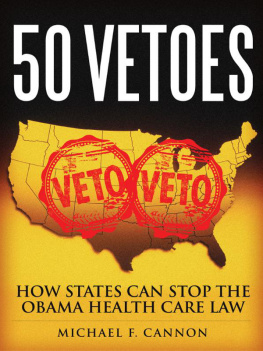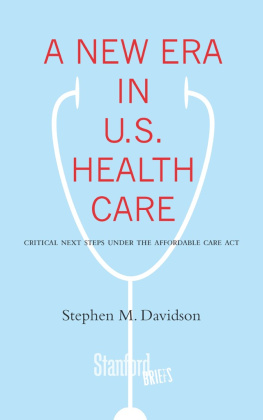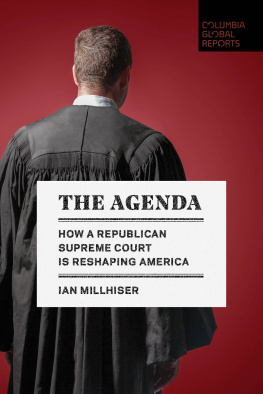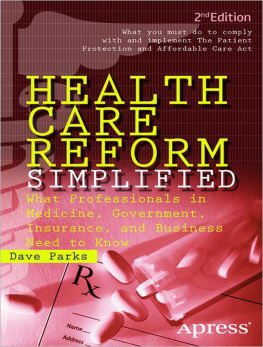
50 VETOES
HOW STATES CAN STOP THE
OBAMA HEALTH CARE LAW
MICHAEL F. CANNON

Copyright 2013 by the Cato Institute.
All rights reserved.
Cover design by Jon Meyers.
Printed in the United States of America.
Ebook ISBN: 978-1-939709-05-9
CATO INSTITUTE
1000 Massachusetts Ave., N.W.
Washington, D.C. 20001
www.cato.org
Contents
Executive Summary
Introduction
The Role of States in Implementing the PPACA
Why States Should Reject Exchanges
Refusing to Create an Exchange...
... Blocks the Employer Mandate
... Exempts Millions from the Individual Mandate
... Frees Consumers to Purchase Low-Cost Coverage
... and Reduces Federal Deficits
The IRSs Illegal Taxes
A Legislative Strategy
Reject the Medicaid Expansion...
... The Entire Medicaid Expansion
A Fatal Blow? States Can Force Congresss Hand
Real Health Care Reforms
Conclusion
Appendix A: Individuals Injured by the IRSs Tax-Credit Rule
Appendix B: A Strengthened Health Care Freedom Act 274
Notes
Executive Summary
Despite surviving a number of threats, President Obamas health care law remains harmful, unstable, and unpopular. It also remains vulnerable to repeal, largely because Congress and the Supreme Court have granted each state the power to veto major provisions of the law before they take effect in 2014.
The Patient Protection and Affordable Care Act (PPACA) itself empowers states to block the employer mandate, to exempt many of their low- and middle-income taxpayers from the individual mandate, and to reduce federal deficit spending, simply by not establishing a health insurance exchange. Supporters of the law do not care for this feature, yet they adopted it because they had no choice. The bill would not have become law without it.
To date, 34 states, accounting for roughly two-thirds of the U.S. population, have refused to create Exchanges. Under the statute, this shields employers in those states from a $2,000 per worker tax that will apply in states that are creating Exchanges (e.g., California, Colorado, New York). Those 34 states have exempted at least 8 million residents from taxes as high as $2,085 on families of four earning as little as $24,000. They have also reduced federal deficits by hundreds of billions of dollars.
The Obama administration is nevertheless attempting to tax those employers and individuals, contrary to the plain language of the PPACA and congressional intent, and to deny millions of Americans the opportunity to purchase low-cost, high-deductible coverage. Employers, consumers, and even state officials in those 34 states can challenge those illegal taxes in court, as Oklahoma has done. States can also block those illegal taxesand even stop the federal government from operating an Exchangeby approving a strengthened version of the Health Care Freedom Act.
The PPACAs Medicaid expansion, which would cost individual states up to $53 billion over its first 10 years, is now optional for states, thanks to the Supreme Courts ruling in NFIBv. Sebelius. Some 16 states have announced they will not expand their programs, while half of the states remain undecided. Yet the Obama administration is trying to coerce states into implementing parts of the expansion that the Court rendered optional. States can replicate Maines lawsuit challenging this arbitrary attempt to limit the Courts ruling.
Collectively, states can shield all employers and at least 12 million taxpayers from the laws new taxes, and still reduce federal deficits by $1.7 trillion, simply by refusing to establish Exchanges or expand Medicaid.
Congress and President Obama have already repealed the third new entitlement program the PPACA createdthe Community Living Assistance Services and Supports Act, or CLASS Actas well as funding for the co-op plans meant to serve as an alternative to a public option. A critical mass of states exercising their vetoes over Exchanges and the Medicaid expansion can force Congress to reconsider, and hopefully repeal, the rest of this counterproductive law. Real health care reform is impossible until that happens.
Michael F. Cannon is director of health policy studies at the Cato Institute and coeditor of Replacing Obamacare (Cato, 2012).
The 34 States That Have Vetoed Major Provisions of the Patient Protection and Affordable Care Act
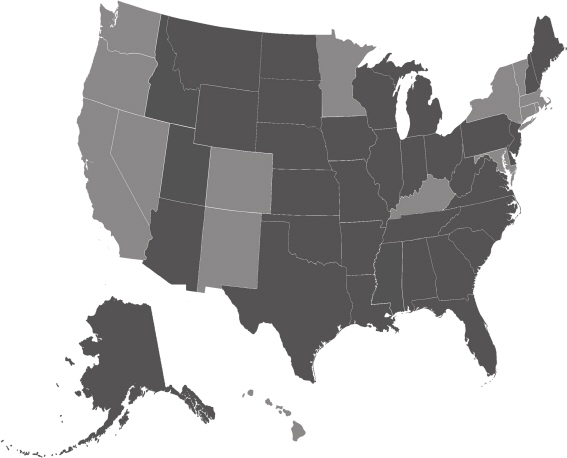
Source: Kaiser Family Foundation, State Decisions for Creating Health Insurance Exchanges, State Health Facts, February 15, 2013, http://statehealthfacts.kff.org/comparemaptable.jsp?ind=962&cat=17; Kaiser Family Foundation, State Activity around Expanding Medicaid under the Affordable Care Act, State Health Facts, February 26, 2013, http://www.statehealthfacts.org/comparereport.jsp?rep=158&cat=4.
Introduction
The Patient Protection and Affordable Care Act of 2010 (PPACA) depresses economic activity, eliminates jobs, increases health care costs, makes access to care less secure, increases the burden of government, and traps people in poverty. Repealing the PPACA is essential to making health care better, more affordable, and more secure.
In just its first six years, the PPACA will reduce economic output by as much as $750 billion
The individual mandate requires nearly all Americans to purchase a government-designed health plan or pay a penalty. That mandate has already increased the cost of health insurance for millions of Americans,
The PPACA will make access less secure in numerous ways. Its community rating price controls will destroy innovations that make health insurance better and more secure. The Acts Medicaid expansion will crowd out private health insurance and leave many Americans with less secure access to care.
The Act will further reduce access to care by reducing incomes. From 2013 through 2022, it imposes $1.2 trillion in new taxes
Despite those new taxes, the PPACA spends money the federal government simply does not have. The federal debt stands at $12 trillion in 2013, or 76 percent of gross domestic product. In 2013, the federal treasury will run a projected $845 billion deficit. Under current law, annual deficits will cause the federal debt to grow to $20 trillion by 2023. According to the Congressional Budget Office (CBO):
Along such a path, federal debt held by the public will equal a greater percentage of GDP than in any year between 1951 and 2012 and will be far above the average of 39 percent over the 19732012 period. Moreover, it will be on an upward trend by the end of the decade. Debt that is high by historical standards and heading higher will have significant consequences for the budget and the economy.... The nations net interest costs will be very high... [and] will require the government to raise taxes, reduce benefits and services, or undertake some combination of those two actions. National saving will be held down... which in turn will decrease income in the United States.... The likelihood of a fiscal crisis will be higher.... Those consequences would be exacerbated if federal debt exceeded the amounts projected in CBOs baseline, as it would if certain deficit-reducing policies that are scheduled to take effect were instead reversed without being replaced by other policies with similar budgetary effects.
Next page
